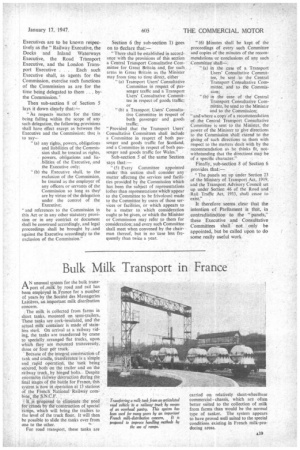Executives are to be known respectively as the" Railway Executive,
Page 49

If you've noticed an error in this article please click here to report it so we can fix it.
the Docks and Inland Waterways Executive, the Road Transport Executive, and the London Transport Executive . . . Each such Executive shall, as agents for the Commission, exercise such functions of the Commission as are for the time being delegated to them . . by the Commission.'
Then sub-section 8 of Section 5 lays it down clearly that:—
" As respects 'matters for the time being falling within the scope of any such delegation, the following provisions shall have effect except as between the Executive and the Commission; that is to say
" (a) any rights, powers, obligations and liabilities of the Commission shall be treated as rights, powers, obligations and lia.bilities of the Executive, and the Executive only:
" (b) the Executive shall, to the exclusion of the Commission, be treated as the employer of any officers or servants of the Commission so long as they are by virtue of the delegation under the control of the Executive;
"and references to the Commission in this Act or in any other statutory provision or in any contract or document shall be construed accordingly, and legal proceedings shall be brought by and against the Executive accordingly to the exclusion of the Commission."
Section 6 (by sub-section 1) goes on to declare that:—
" There shall be established in accord
ance with the provisions of this section a Central Transport Consultative Committee for Great Britain and, for such areas in Great Britain as the Minister may from time to time direct, either " (a) Transport Users' Consultative Committee in respect of passenger traffic and a Transport Users' Consultative Committee in respect of goods traffic; or "(b) a Transport Users' Consultative Committee in respect of both passenger and goods traffic; "Provided that the Transport Users' Consultative Committees shall include a Committee in respect of both passenger and goods traffic for Scotland, and a Committee in respect of both passenger and goods traffic for Wales."
Sub-section 5 of the same Section says that:— " (5) Every Committee appointed
under this section shall consider any matter affecting the services and facilities provided by the Commission which has been the subject of representations (other than representations whichappear to the Committee to be frivolous) made to the Committee by users of those services or facilities, or which appears to be a matter to which consideration ought to be given, or which the Minister or Commission may refer to them for consideration; and every such Committee shall meet when convened by the chairman thereof, but in no case less frequently than twice a year.
" (6) Minutes shall be kept of the proceedings of every such Committee and copies of the minutes of the recommendations or conclusions of any such Committeeshall—.
• " (a) in the case of a Transport
Users' Consultative Committee, be sent to the Central Transport Consultative Committee, and to the Commission;
"(b) in the case of the Central Transport Consultative Committee, be send to the Ministet and to the Commission;
and where a copy'of a recommendation of the Central Transport Consultative Committee is sent to the Minister, the power of the Minister to give directions to the Commission shall extend to the giving of such directions to them with respect to the matters dealt with by the recommendation as he thinks fit, notwithstanding that the directions may be of a specific character."
Finally, sub-section 8 of Section 6 provides that:— " The panels set up under Section 23 of the Ministry of Transport Act, 1919, and the Transport Advisory Council set up under Section 46 of the Road and Rail Traffic Act, 1933, shall cease to exist.
It therefore seems clear that the intention of Parliament is that, in contradistinction to the "panels," these Executive and Consultative Committees shall not only be appointed, but be called upon to do some really useful work












































































